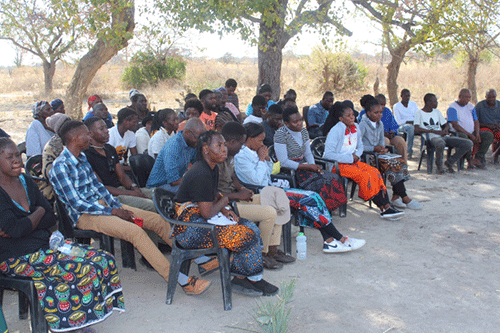George Sanzila
MUYAKO – Community members of the Muyako village in the Katima Mulilo rural constituency of the Zambezi region are suffering devastating crop losses due to wild animals. Many of them failed to harvest their crop fields during the last planting season as marauding groups of animals such as elephants, buffaloes and hippos devoured the crops.
They accused environment ministry officials of failing to attend to their plight timeously when cases of human-wildlife conflict are reported to them. Community members narrated their ordeal to the Parliamentary Standing Committee on Natural Resources, which is conducting public hearings on human/wildlife conflict in the Zambezi region.
The hearings follow a motion which was tabled in the National Assembly in March this year, and referred to the committee for further consultations. Community members stated that their livelihoods depend on crop farming, and that the little compensation they receive is a mere drop in the ocean as the costs involved in ploughing far exceed the set compensation fees.
“We survive through ploughing. This year, quite a number of farmers did not harvest anything at all due to elephants and buffaloes. For us to plant, there are a lot of costs involved such as preparing the field, buying seeds, ploughing, weeding and fending off wild animals. All these require money,” complained one resident.
“When we call on the officials from the ministry, they delay in coming here, citing lack of transport. But they would quickly show up when you end up killing such problem animals, confiscate both your gun and carcass, and even put you in prison. Many incidents have been reported to the ministry, but to no avail,” he added. Compensation The community said to aggravate matters, the processing of such compensation claims is painfully slow. It became apparent during the meeting that there is a backlog of claims, with some outstanding payments dating back to 2019.
During a meeting held earlier with the Masubia Traditional Authority at Bukalo, the Ngambela (premier) of the Masubia tribe Albius Kamwi likewise described the compensation for losses as negligible, noting that farmers make many financial sacrifices during a ploughing season. He further accused the line ministry of ostracising the traditional authority by failing to alert the Khuta (chiefs’ council) when incidences of humanwildlife conflict occur in their areas of jurisdiction.
Kamwi was further not happy that only three wild animal types are mentioned in instances of compensation in case of damage to crop fields. “They say only three animals are included in the policy. What if damages or losses are as a result of animals other than what is mentioned in the policy?” he enquired. The 2018-2027 Revised National Policy on Human-Wildlife Conflict Management states that payments to crops will be made for damages caused only by elephants, buffaloes and hippopotamus. The policy further lists the compensation fees for the loss of cattle at N$3 000 and damages to crops at N$250, and N$1 000 for one-quarter of a hectare and one hectare, espectively.
Urgent Review
Zambezi governor Lawrence Sampofu echoed similar sentiments when lawmakers paid him a courtesy call. He observed that human-wildlife conflict has drastically increased due to the region finding itself in the middle of the Kavango-Zambezi Trans-frontier Conservation Area (KAZA-TFCA), the second-largest nature and landscape conservation area, replete with a large elephant population. He lamented the compensation policy for losses incurred as a result of humanwildlife conflict, and called for an urgent review.
Sampofu then commended the Namibian government for its stance not to be pressured to allow the ban on the sale of ivory, adding that the current conservation efforts by the country required financial resources, which could have been generated from its ivory stockpile.
“I want to thank the government for taking a stand not to ban the sale of ivory. How do we manage our resources without funds? We need to have a discussion with CITES to allow us to sell our ivory to generate money for these conservation activities,” emphasised the governor. Impediments Chief Warden from Wildlife and National Park Management in the environment ministry Maani Matomola noted that a lack of transport and staff, and the rationing of fuel for official cars allocated to the ministry, are among a host of impediments affecting their operations in the region.
“We do not have enough vehicles as we speak, including staff. Only three field rangers are currently active and responsible for the entire region. We are allocated only two full tanks of fuel per month for our operations, with no bush or cellphone allowance,” he complained. It also became apparent that the activities of the ministry still remain centralised, contributing further to bureaucracy and a lack of efficiency.
Matomola noted that one of the main reasons contributing to human-wildlife conflict is community members who decide to settle in core conservancy areas. Breadbasket Chief Regional Officer Reginah Ndopu-Lubinda said the regional council has been contemplating ways to restore the region’s former glory as the breadbasket of Namibia by exploring other alternatives to wildlife conservation, such as reducing the size of conservancies to allow communities to farm and produce enough food for their livelihoods.
“Most of our communities are not receiving substantial revenue from the conservation of wildlife. The Zambezi region has quite a number of conservancies. The other alternative is to look at agriculture. We have people in some areas saying maybe we need to reduce the number of conservancies to allow people to be able to farm. We need to strike a balance. Do we leave our people to go hungry while protecting our wildlife, or do we unlock certain parts of these areas to allow people to produce food?”, Ndopu Lubinda asked rhetorically.
The committee will compile a comprehensive report for tabling in parliament for further action. It is led by Agnes Kafula, and comprises fellow MPs Mike Venaani, Annakletha Sikerete and Tangeni Iijambo.
* George Sanzila works for the National Assembly in the Division: Research, Information, Publications and Editorial Services.



